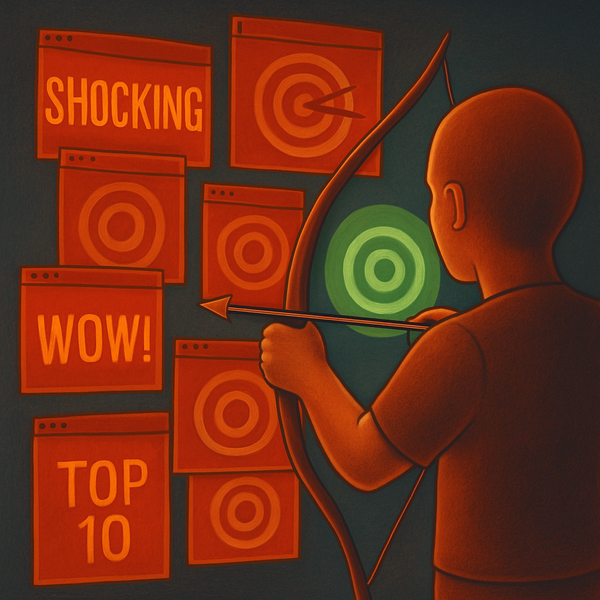Goals and Consequences: Post Mortem
Well, I made it through the month long challenge I wrote about in my last post, and the fact that I'm just now writing this(about 3 weeks after I finished it) should give a good indicator as to how it went.
The good news: I did manage to hit 80% or better every week, so I didn't have to donate any money to the anti-charity!
The bad news: I ran myself into the ground with that level of output, and the camping trip that took place the weekend following the challenge was the final nail in the coffin. I'm still not back to a real normal routine with good, consistent sleep habits yet.
The silver lining: I think I spotted some patterns and key takeaways that could lead to the architecture for a more sustainable, longer term framework for increased productivity balanced with healthier lifestyle habits. So my goal with this post is to lay that out as clearly as possible.
Humans Are Not Robots
If you have dreams of entrepreneurship and find your news feeds are filled with seemingly endless amounts of entreporn, you might think that the only reason someone else has achieved that goal while you haven't is because they've put in the work.
They hustled, they grinded, they worked long hours. They sacrificed on sleep, health, and relationships. They did the hard work, and they earned their keep(and of course, they can teach you the three closely guarded secrets that other entrepreneurs don't want you to know!(All for just three monthly payments of $97!)).
These ridiculous hero stories people paint for themselves do far more harm than good, and try to craft an overly simplistic image (for sales purposes) of a roadmap to success that conveniently overlooks the infinite number of tiny details in the persons life that led them to that point.
There's no room for nuance in our short attention span social-media based sales ecosystem. But here in the U.S. we've got a masochistic love of self-sacrifice and hard work, so this is a convenient frame to put a story in from a sales perspective.
The roundabout point that I'm trying to make here is that this simplistic narrative is incredibly damaging for a great many people.
We humans are not robots. We can't simply prescribe ourselves 14 hour work days for a few months or years on end and expect entrepreneurial success to come out the other end. Studies have shown the actual amount of productive work per day humans are capable of is FAR lower than the 8 hours (minimum) we're expected to put in.
In his interview on Rogan's podcast, Naval Ravikant said as a modern "intellectual athlete" you want to function like an athlete:
You train hard, then you sprint, then you rest, then you reasses, you get your feedback loop, then you train some more, sprint again, then rest, then reassess. This idea that you're going to have linear output just by cranking every day at the same amount of time, that...that's machines! Machines should be working 9-5, humans are not meant to be working 9-5.-Naval Ravikant
In some ways, this feels like the trap I've fallen into with these high output/productivity challenges. I'm trying to program myself into high output for an unreasonable amount of time, and high levels of stress/anxiety come out the other end along with days or weeks of what I can only describe as a hangover of workaholism.
Slowing Down to Speed Up
I came to this realization on one of the many retreats I did during my time living in Colombia; that I needed to "slow down to speed up": to fully cut myself off from work and work related thoughts on the weekends (slow down by resting properly) in order to "speed up" by being more productive in my working hours.
And in true Brandon fashion I logically knew that information without truly understanding it; or at least it appears that way since I didn't take it to heart and continued to work myself ragged on many occasions over the past few years.
The big realization that's come from this experiment is what I believe to be a more realistic and optimal time frame for work-rest cycles. This challenge started off VERY well. My output was incredibly high for the first two weeks, and I managed to learn a great deal about a new coding language and put together a number of small projects.
It was right around the end of week two/halfway through week three that I began to feel some serious burnout. I struggled to stay focused, barely managed 6 productive hours per day (and many times didn't), and in general just couldn't wait for this hellish experiment to be over.
The fact that, at the end of the second week I still had two weeks to go, definitely increased the feeling of burnout. If it had been a two week long work sprint I know I could have pushed ahead with the finish line in sight, but the length of time remaining made that much harder to accept.
I think the framework Naval laid out in the quote I shared above leads the way to a more ideal solution. Month long work/rest cycles, based around projects or specific goals:
- Week 1: Train hard. In my case, this could mean learning a new concept or skill-set in coding, or perhaps even a new coding language. Dive into every resource imagineable, and build a steel framework of understanding of the core pieces at play within the language.
- This should ideally end with some type of output, likely a blog post where I lay out my understanding of the topic from a high level perspective.
- As the saying goes, the best way to learn is to teach. If I can thoroughly explain how the thing I've learned works and what the underlying mechanisms are, I'll be more competent in using it in a professional context. I'll also have a public facing piece of content to show to prospective employers.
- Week 2-3: This is where the real work begins. A two week long work sprint using the tech stack in question, where I come out the other end with a finished project that I can add to my portfolio.
- If I do this for 2 or 3 months, that'd pad out my portfolio and skill-set quite nicely. If I did it for 6 months I'd be a pretty competent full-stack developer at that point.
- From what I've done in the past with code, I think that two weeks of solid work is enough to crank out an MVP for a product. Since I intend for code to eventually lead me back to entrepreneurship, creating a framework that I can use when I have a good idea for a potential SaaS product would be very useful.
- Week 4: Reflect and reassess on the work sprint, project completed, and knowledge acquired. Use this knowledge to decide on the next topic to tackle, then take a few days off later in the week to relax.
- Maybe go on a camping trip or short vacation. Or just stay at home and read fiction, play music, paint, whatever you're in to. Do whatever you want so long as it's relaxing and gives your brain a break from work-related thoughts.
This isn't exactly a new concept. Many parallels could be draw between this and training periodization, a concept in strength training and athletics that lays out periods of progressive training, followed by a rest period, then a new progressive training cycle beginning from the new baseline you've created.
This framework simply lays out a way to do so when it comes to intellectual and professional pursuits. I've laid it out in the context of coding, but these techniques could easily be applied to any industry or field of study.
Not only that, I think they allow for faster progression in a more sustainable way, that would actually allow people to enjoy the ride as they're on it. You know, instead of becoming a full-on masochist in their relationship with work. A man can dream, can't he?
Till next time,
Brandon


